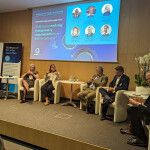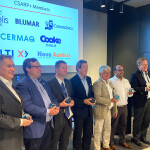The ongoing review of the European Union's Common Fisheries Policy will be at the forefront of Wednesday's "Sustainability of the European Seafood Industry" conference at the European Seafood Exposition in Brussels. Along with other industry leaders, Tony Long, director of World Wildlife Fund's European policy office, will discuss the review and what needs to be done to prevent Europe's seafood industry from collapsing. Long talked to SeafoodSource on Thursday about WWF's take on the issue and its role in the conference.
Why was it important that WWF has a voice at this conference?
The seafood expo is the biggest in the world, and so it's really important for an organization like WWF to be able to talk directly with the representatives from the seafood industry — so that means the catchers and the processors and the retailers — so that we can talk directly to each other and not just through press releases but have direct contact. Communications are really important at this time.
What will you speak about at the conference?
The main message for my organization is that we have a once in 10-year moment of fisheries reform that's just coming up in the next two to three years, and this is the review of the Common Fisheries Policy.
If we have this moment then we have to face up to the crisis in the fishing industry, we can't just brush it under the carpet. The crisis is too many boats chasing too few fish and we're waking up to the full consequences of what that means, and what it means is that we're facing a massive decline in the fish stocks. And that's bad for the industry, fishing communities and its really bad for the conservation and long-term survival of the industry.
What about the Common Fisheries Policy requires change?
I think the first thing is that we hav to [do is] get out of crisis management. We have to put ourselves on the track for a long-term management plan for fish stocks that will create a future for the people engaged in the industry and give certainty for investment decisions, as well as protecting the very resource base on which the industry rests.
So, the first thing is to get out of short-term and into long-term management. The second thing we have to do is match the fishing capacity to the fishing effort. We have to continue to give incentives to remove fishing excess capacity from the fleets, and that also means removing harmful subsidies that are increasing.
The third thing we'll be looking at is to strengthen the fisheries controls and enforcement to tackle illegal fishing. One of the problems in the industry is when we have free riders who are working outside the rules and regulations and they not only profit themselves but they damage the reputation and undermine the profitability of the rest of the sector, and that's unacceptable.
Fourth, we'll be saying that we have to de-politicize. We have to take away the management decisions that don't belong there. We don't need ministers of state and ministers of fisheries talking about annual quotas and opening and closing dates. These things do not belong at ministry levels. We need to decide proper government management.
What role is the WWF playing in the review?
We are — along with all sections consumers, retailers, catchers [and] other NGOs (non-governmental organizations) — all consultants at this point. We are all being invited to submit our comments at least until the end of this year. We will put together leaflets and booklets explaining our positions.
In 2010 and 2011 after this consultation phase is finished we will get legislative proposals from the commission. That's when we'll be using the WWF network, and we will be making sure that our offices are fully briefed on what is being proposed. The real battleground for the reform proposals is going to be fought as much in the national capitals as it is in Brussels.
We will be making sure that we're giving the same messages in all parts of Europe to the right people at the right time so that we don't miss this opportunity.
April 23, 2009





